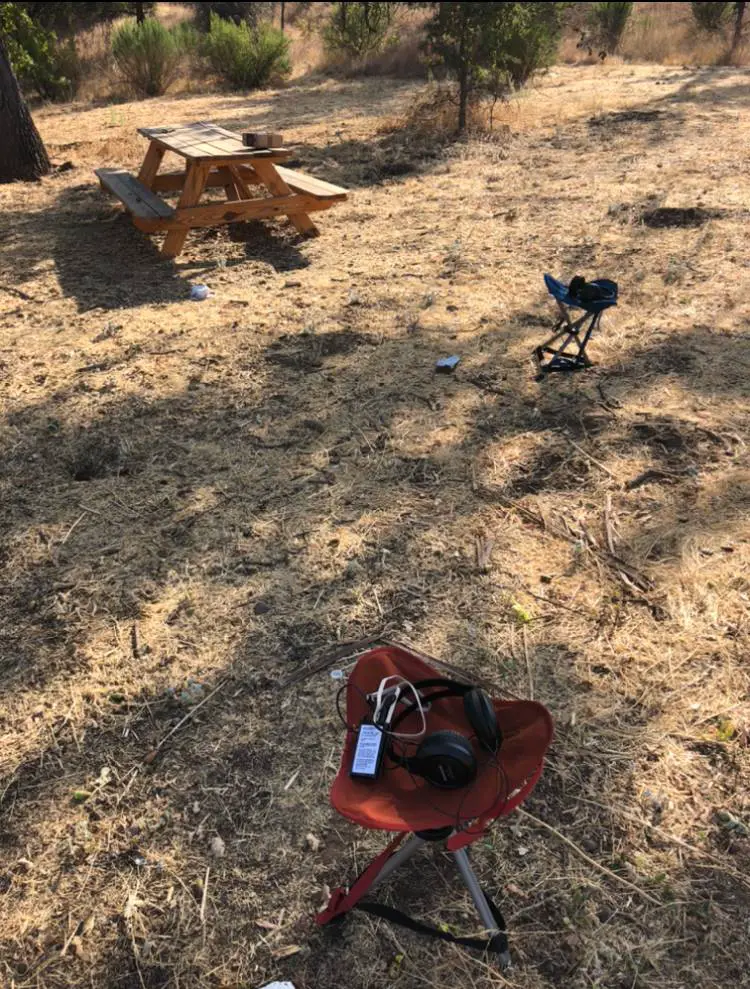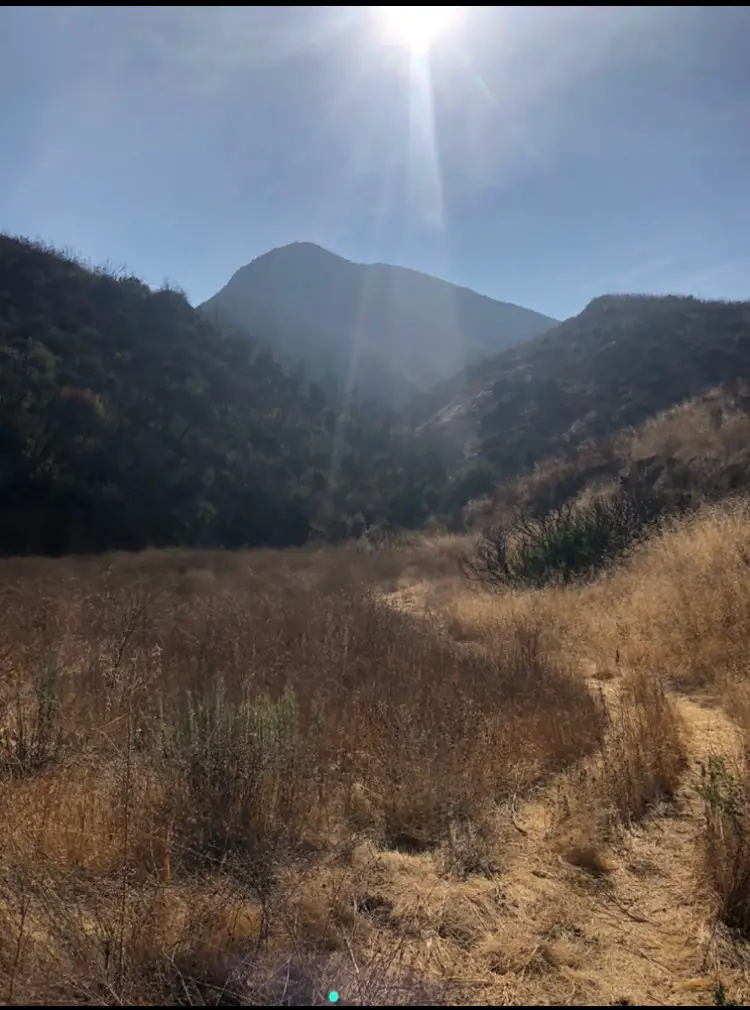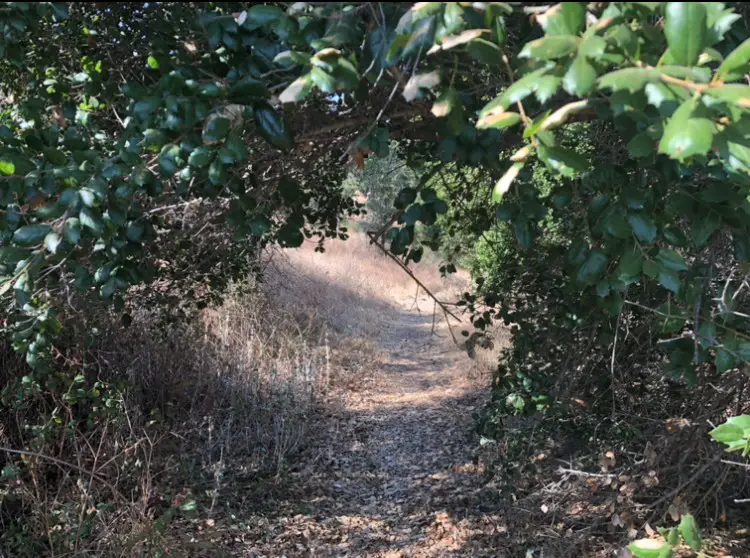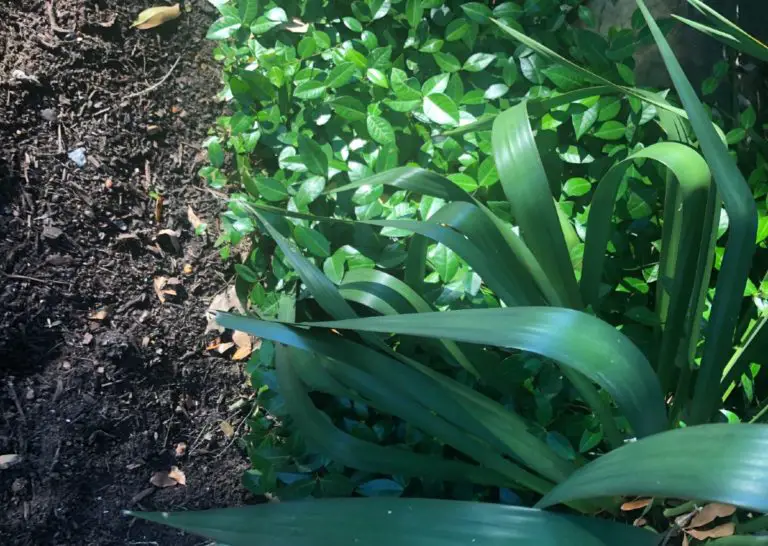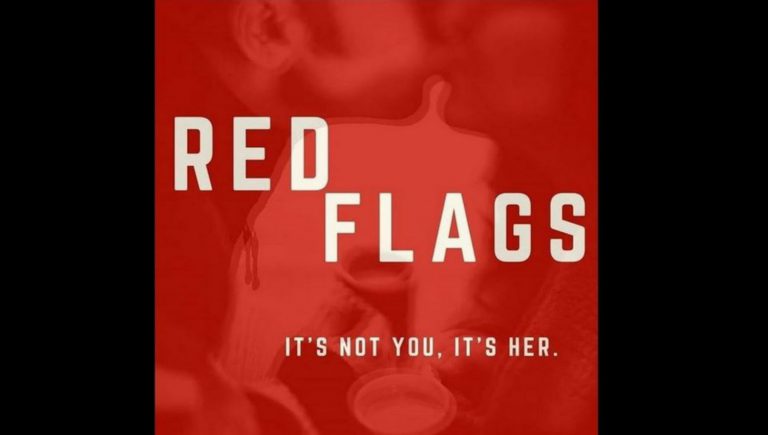I’ve wandered along a dirt path, lost in the pre-show music and musings, and I’ve now found myself on a sunny bluff looking down on an abandoned church. I look at the branching path ahead of me and contemplate my level of ambition, when abruptly the music cuts out and I hear Monica Miklas’ soothing voice crackle through the FM static. She urges me to pause and to look, and as I take in the dusty landscape with greater intention she begins to meditatively describe the ever transforming land, reminding me that where I stand was once an ocean, might one day be a mountain. Finally, she turns my attention towards my internal landscape: “Is this what you thought you’d look like when you were younger? Is this what you thought the world would look like?” I whisper a nostalgic “no” to an empty meadow, setting the tone for the internal and external exploration to come in Capital W‘s Fire Season.
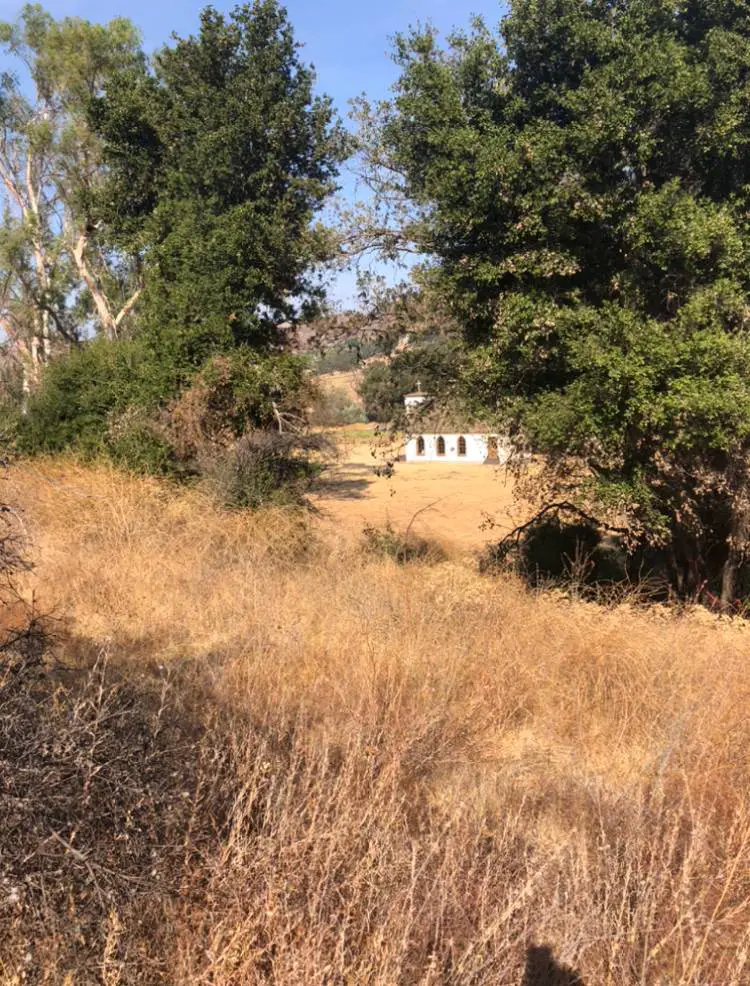 Thematic Wanderings
Thematic Wanderings
Capital W’s Fire Season is an in person but socially distanced meditative and immersive hiking journey at Paramount Ranch in Agoura Hills, CA. During the hour long run time, participants are given free reign to explore the space before coming back together to close out the experience as a group. The show emphasizes social distancing as a theme by allowing completely free exploration of an outdoor ranch space, accompanied by meditative prompts, custom music, original artwork, and a political call to action. The tone is hard to pin down as the prompts range from abstract retellings of well known myths to unsettling descriptions of the current climate crisis to deeply personal and detailed accounts of love and sexuality – a variety show of thought provoking and loosely connected content.
Monica Miklas is the participants’ guide, and is accompanied by a support team that help guide setup for participants and facilitate the show’s transition into the full group finale. Participants are given flexibility as to their intensity level – challenging hikes are available, but participants are just as welcome to sit at a bench for the duration of the show. The prompts interact with the scenery, scorched land that calls to mind the recent fires both as a crisis of human creation and as a metaphor for our time. Or, as Miklas would put it, “doesn’t the world just feel hotter?”. With only 8 participants across an entire ranch, it is likely that a solo participant will not encounter any other participants or facilitators until the group portion of the show – the interactivity is with nature, not with characters or facilitators. The end result is a thematically ambitious abstract piece that reflects the political and geographical climate of this exact moment in history.
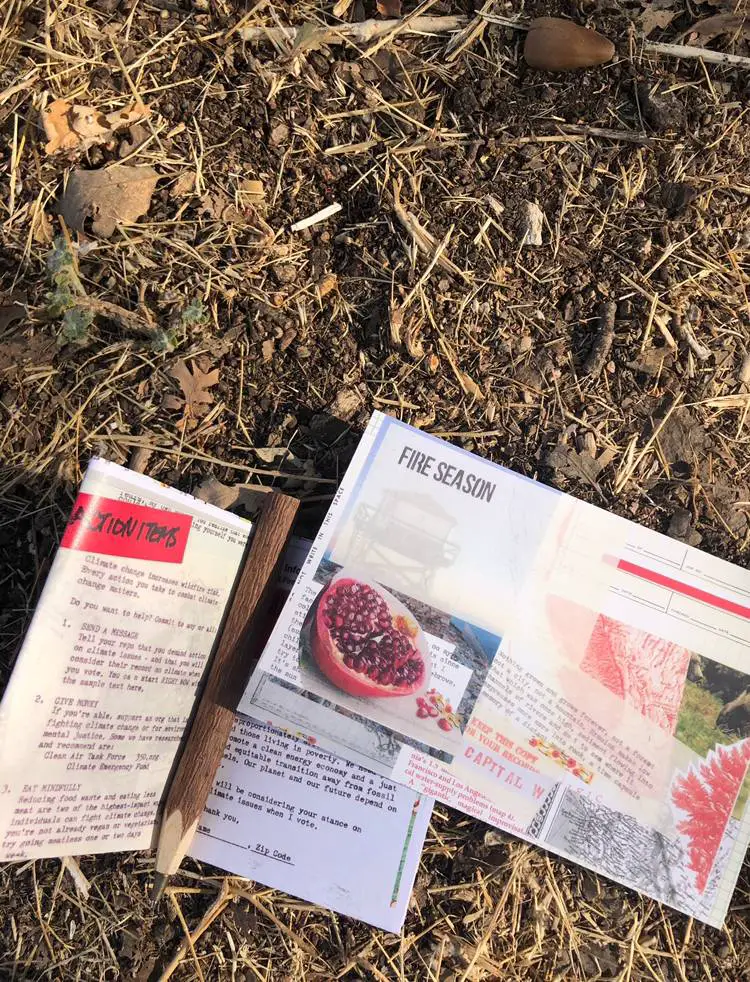 Open World Theater
Open World Theater
Fire Season makes social distancing a central tenet of the experience, rather than a mere requirement, reframing the way that we view our current challenges and frustrations. Participants check in one at a time and are given temperature checks and freshly sanitized FM receivers, high quality headphones, and camping stools. Participants are free to explore the grounds of the western town and surrounding hiking trails, with the option to make their experience a fairly strenuous hike if they so choose (they will be told when to turn around in order to make their way back to the western town in time for the finale). In the style of an open-world adventure game or a rugged western movie, participants set off on their very own journey, accompanied by the beautiful and compelling musings of Miklas’ mind, which serve as their own internal monologue. Sadly, in my case, I frequently found my path blocked by my receivers’ limited range, with static warning me that I’d reached the boundary of my journey. With about 15 minutes remaining, participants are called back to a central location for some facetime with Miklas and their fellow travelers, as well as a political call to action that brings home the “so what” of the journey and reflection.
Inside Miklas’ Mind
The audio content felt as pleasantly winding as the trails themselves, with each new section bringing a new theme, tone, and question, just as each turn in the path brings new and unique scenery. Miklas might draw a participant’s attention to the uniqueness of a mood, space, or their own body in a given story, draw them into a philosophical contemplation of societal progress in the next, and deposit them back in a grounding tactile observation of the landscape around them in a third. The cadence of the audio makes it easy for participants to relax into a contemplative rhythm, while the content keeps it fresh and versatile, connecting with different participants in different ways. Not every vignette will hit home for all, but the mood and content is ever changing, and there’s never a dull moment. In fact, ever changing landscapes, lives, and societies is a main theme of the piece itself. As Miklas herself reminds us, systems tend towards discord. The audio incorporates the landscape brilliantly – I was struck by the symbolism of “bushes coming up around their own skeletons”, and began to see the very plants around me as reflections of my story and humanity’s. The overall mood is somber, contemplative, but compassionate. This is a mature and thought provoking experience of the now.
While the language is predominantly poetic, there are some themes of sexuality, death, and destruction. The content is slow moving and highly intellectual and contemplative in nature. Concepts like “love predating oceans” and the world “feeling” hotter this year will resonate deeply with a thoughtful, emotionally self-aware, or politically engaged participant. Concepts are often presented abstractly and left as open ended prompts for further contemplation. There is an excellent balance of structure and sophistication in the content, providing for a challenging and thoughtful physical and intellectual journey through the piece and the space.
A Different Type of Immersion
Previous Capital W shows have focused on personalization and interaction between participant and facilitator, but Fire Season takes a different approach. The immersion in this case is in the environment. There is a high level of agency as participants are free to wander the entire ranch. The freedom is almost overwhelming, and feels rebellious during a time when we are all used to being closed up in quarantined spaces. There are countless paths and landmarks, varying in difficulty and elevation. While participants can presumably attend together, the audio intentionally creates a solitary world, thematically reflecting the isolation of quarantined society, and participants in the same group will have little occasion to speak with each other. The piece is best experienced alone and with a solitary, reflective, and exploratory mindset. Agency is also achieved in a different way than in previous pieces. There are no “characters” to speak of. Each participant is engaging primarily with Miklas’ prompts and their own mind. It is a very natural experience, but not a personally interactive one. Participants are given agency to explore, but have no influence on the events, themes, or content of the piece. The content is enjoyable and engaging, but participants should not expect an immersive or personalized show.
Finally, the vignette format is compelling, but there is no narrative thread running through the experience. For me, the audio was refreshingly abstract, allowing my mind to wanderer with my feet towards the challenges of our times. For another participant, they might find that the lack of narrative and structure for most of the piece leaves them restless or unsure what to do. In a similar vein to the “what do you need?” series previously performed by Capital W, mindfulness is the focus here. While I normally prefer narrative heavy experiences, I find that Capital W has their finger on the pulse of the strained souls of quarantined humans, and the show still hit home for me, even with very little narrative structure.
The Team
The overall focus of the team was on facilitating a seamless experience for participants. In addition to contributing music and visual art, team members are on hand to ensure Covid safety and shepherd participants through the transitional moments of the experience. The result is a show that feels safe and organized while also being unstructured. The Capital W team operates as a well oiled and collaborative machine, creating a remarkable and unique overall experience.
From a performance perspective, multiple creatives contribute to the experience’s orchestration. Monica Miklas is the show’s champion, credited as writer, performer, and zine and postcard designer of the visual art take home and activism elements. Lauren Ludwig, a Capital W staple and a brilliant performer in her own right, directs and produces. Both women bring sheer overwhelming artistry and vision to the table, as always. The result of the collaboration is contemplative and cohesive. The production is a thematic arc that ties together everything from global warming to covid to heartbreak to death and identities, driven by Miklas’ candid performance style.
The broadcast itself showcases a high production value. Dave McKeeveer’s sound design allows for subtle mood setting and seamless transitions between vignettes. These transitions and pauses helped the piece flow and gave participants space to fill in the gaps with their own thoughts and reflections. Gorgeous original musical compositions by Susan Voelz punctuated each vignette. The music perfectly reflected the landscape around us. Together with the other team members, these talented individuals created a predominantly audio-based experience that was intimate and moving.
Final Thoughts on Fire Season
Capital W’s Fire Season is a journey. It is explorative, thematic, compelling, challenging, and yet candid and compassionate. A departure from both traditional immersive theater and the common socially distant zoom show format, the show is a great way to get out of the house for some reflection and immersion in the outdoors. Although not really ideal for groups, solo participants or those not afraid to separate will find themselves face to face in conversation with their own minds, frustrations, emotions, and judgements. The ideal participant here is one with an interest in contemplative solitude.
Fire Season foregoes linear narrative in favor of site specific immersion and physicality as well as contemplative prompts. Using the “challenge by choice” framework, Fire Season leaves it to participants to discover whatever wonders might await them on the trails. The ranch is a bit of a trek, but getting out of the city is part of the point. Most participants will find a touchstone for their own fears and worries somewhere in Miklas’ prompts. Exploring solitude as well as the landscape around you can be an incredibly empowering experience, and that theme of empowerment is an important counterbalance to the frustration and hopelessness explored in a few of the vignettes. Your adventure awaits – what will you find as you explore both the internal and external spaces?
If you want to read more about Captial W’s previous experiences, check out our reviews on What Do you Need? and Red Flags. Check out our Event Guide for more immersive entertainment throughout the year.

